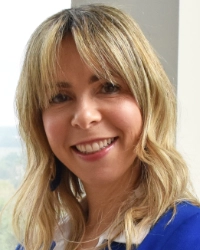 Dr. Valentina Bugani, PhD, is Corporate Training and Professional Skills Development Manager at IRCCS Istituto Romagnolo per lo Studio dei Tumori “Dino Amadori” (IRST), an Italian comprehensive cancer centre. She designs and leads the Integrated System of Competencies, a competency-based framework that links skills mapping, training pathways, and professional development for multidisciplinary healthcare teams.
Dr. Valentina Bugani, PhD, is Corporate Training and Professional Skills Development Manager at IRCCS Istituto Romagnolo per lo Studio dei Tumori “Dino Amadori” (IRST), an Italian comprehensive cancer centre. She designs and leads the Integrated System of Competencies, a competency-based framework that links skills mapping, training pathways, and professional development for multidisciplinary healthcare teams.
She holds a PhD in Pedagogical Sciences from the University of Bologna and has over 20 years of experience in education management, internationalisation, and quality systems. At European level, she is a member of the Health Working Group of the European Commission’s Harnessing Talent Platform and Coordinator of the Training Working Group of Clust-ER Health.
Valentina is involved in several Erasmus+ and international projects, including collaborations with McGill University (RI-MUHC, Canada), focusing on healthcare workforce development, equity, diversity and inclusion, and organisational well-being. She regularly contributes as a speaker and author on competency-based education, lifelong learning, and innovative training models in oncology.
 Dr. Valentina Bugani, PhD, is Corporate Training and Professional Skills Development Manager at IRCCS Istituto Romagnolo per lo Studio dei Tumori “Dino Amadori” (IRST), an Italian comprehensive cancer centre. She designs and leads the Integrated System of Competencies, a competency-based framework that links skills mapping, training pathways, and professional development for multidisciplinary healthcare teams.
Dr. Valentina Bugani, PhD, is Corporate Training and Professional Skills Development Manager at IRCCS Istituto Romagnolo per lo Studio dei Tumori “Dino Amadori” (IRST), an Italian comprehensive cancer centre. She designs and leads the Integrated System of Competencies, a competency-based framework that links skills mapping, training pathways, and professional development for multidisciplinary healthcare teams.
She holds a PhD in Pedagogical Sciences from the University of Bologna and has over 20 years of experience in education management, internationalisation, and quality systems. At European level, she is a member of the Health Working Group of the European Commission’s Harnessing Talent Platform and Coordinator of the Training Working Group of Clust-ER Health.
Valentina is involved in several Erasmus+ and international projects, including collaborations with McGill University (RI-MUHC, Canada), focusing on healthcare workforce development, equity, diversity and inclusion, and organisational well-being. She regularly contributes as a speaker and author on competency-based education, lifelong learning, and innovative training models in oncology.
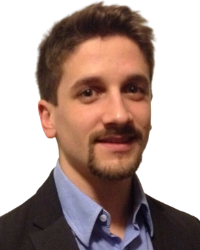 Dr Gianluca Cidonio is a research scientist and a bioengineer, currently Assistant Professor (Researcher Tenure-Track) and Group Leader of the Model and Regenerate (MoRe) and lab at the Department of Mechanical and Aerospace Engineering (DIMA) at the University of Rome La Sapienza.
Dr Gianluca Cidonio is a research scientist and a bioengineer, currently Assistant Professor (Researcher Tenure-Track) and Group Leader of the Model and Regenerate (MoRe) and lab at the Department of Mechanical and Aerospace Engineering (DIMA) at the University of Rome La Sapienza.
Dr Cidonio has been awarded the prestigious ERC Starting Grant 2025 for a total of €1.99 million to engineer a new approach for the fabrication of mineralized tissues.
Dr Cidonio’s academic career initiated in 2015, when he joined the Bone & Joint Research Group led by Prof Richard Oreffo at the University of Southampton (UK). Gianluca focused on the study of 3D bioprinting technologies to guide skeletal tissue regeneration. He worked extensively on the development of novel nanocomposite bioinks for the printing of living human bone marrow stromal cells and the regeneration of bone tissue. In 2019, Dr Cidonio joined the Center for Life Nano- & Neuro-Science at the Italian Institute of Technology, contributing to microfluidic-bioprinting for complex tissue substitutes and is now Senior Affiliated Researcher. Dr Cidonio is presently dedicated to translating microfluidic 3D bioprinting from labs to clinics, aiming to provide clinical solutions for musculoskeletal diseases and impairments.
 Dr Gianluca Cidonio is a research scientist and a bioengineer, currently Assistant Professor (Researcher Tenure-Track) and Group Leader of the Model and Regenerate (MoRe) and lab at the Department of Mechanical and Aerospace Engineering (DIMA) at the University of Rome La Sapienza.
Dr Gianluca Cidonio is a research scientist and a bioengineer, currently Assistant Professor (Researcher Tenure-Track) and Group Leader of the Model and Regenerate (MoRe) and lab at the Department of Mechanical and Aerospace Engineering (DIMA) at the University of Rome La Sapienza.
Dr Cidonio has been awarded the prestigious ERC Starting Grant 2025 for a total of €1.99 million to engineer a new approach for the fabrication of mineralized tissues.
Dr Cidonio’s academic career initiated in 2015, when he joined the Bone & Joint Research Group led by Prof Richard Oreffo at the University of Southampton (UK). Gianluca focused on the study of 3D bioprinting technologies to guide skeletal tissue regeneration. He worked extensively on the development of novel nanocomposite bioinks for the printing of living human bone marrow stromal cells and the regeneration of bone tissue. In 2019, Dr Cidonio joined the Center for Life Nano- & Neuro-Science at the Italian Institute of Technology, contributing to microfluidic-bioprinting for complex tissue substitutes and is now Senior Affiliated Researcher. Dr Cidonio is presently dedicated to translating microfluidic 3D bioprinting from labs to clinics, aiming to provide clinical solutions for musculoskeletal diseases and impairments.
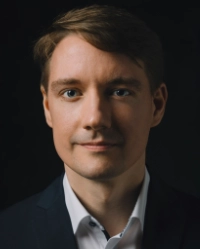 Ákos Diósdi studied Cell and Molecular Biology at the University of Szeged, Hungary. After earning his BSc, he joined the Biological Image Analysis and Machine Learning Group (BIOMAG) at the Biological Research Centre, where he completed his MSc in Bioinformatics. He received the Discipuli pro Universitate Award in 2019 for academic excellence, followed by the Straub Young Researcher Award for his scientific achievements. Currently pursuing his PhD under Prof. Péter Horváth, Ákos focuses on advanced imaging technologies, including light-sheet microscopy, in vitro 3D models, tissue clearing protocols, and computational biology. His interdisciplinary work combines experimental biology, microscopy engineering, and algorithmic development to address challenges in 3D imaging and analysis. He is co-inventor of a PCT patent and a registered utility model protecting a novel plate assembly for rapid, high-penetration-depth imaging with light-sheet microscopy. This patented innovation directly enabled the development of the HCS-3DX platform, which integrates custom hardware and AI-driven automation for next-generation 3D high-content screening, and served as the technological foundation for a publication in Nature Communications.
Ákos Diósdi studied Cell and Molecular Biology at the University of Szeged, Hungary. After earning his BSc, he joined the Biological Image Analysis and Machine Learning Group (BIOMAG) at the Biological Research Centre, where he completed his MSc in Bioinformatics. He received the Discipuli pro Universitate Award in 2019 for academic excellence, followed by the Straub Young Researcher Award for his scientific achievements. Currently pursuing his PhD under Prof. Péter Horváth, Ákos focuses on advanced imaging technologies, including light-sheet microscopy, in vitro 3D models, tissue clearing protocols, and computational biology. His interdisciplinary work combines experimental biology, microscopy engineering, and algorithmic development to address challenges in 3D imaging and analysis. He is co-inventor of a PCT patent and a registered utility model protecting a novel plate assembly for rapid, high-penetration-depth imaging with light-sheet microscopy. This patented innovation directly enabled the development of the HCS-3DX platform, which integrates custom hardware and AI-driven automation for next-generation 3D high-content screening, and served as the technological foundation for a publication in Nature Communications.
 Ákos Diósdi studied Cell and Molecular Biology at the University of Szeged, Hungary. After earning his BSc, he joined the Biological Image Analysis and Machine Learning Group (BIOMAG) at the Biological Research Centre, where he completed his MSc in Bioinformatics. He received the Discipuli pro Universitate Award in 2019 for academic excellence, followed by the Straub Young Researcher Award for his scientific achievements. Currently pursuing his PhD under Prof. Péter Horváth, Ákos focuses on advanced imaging technologies, including light-sheet microscopy, in vitro 3D models, tissue clearing protocols, and computational biology. His interdisciplinary work combines experimental biology, microscopy engineering, and algorithmic development to address challenges in 3D imaging and analysis. He is co-inventor of a PCT patent and a registered utility model protecting a novel plate assembly for rapid, high-penetration-depth imaging with light-sheet microscopy. This patented innovation directly enabled the development of the HCS-3DX platform, which integrates custom hardware and AI-driven automation for next-generation 3D high-content screening, and served as the technological foundation for a publication in Nature Communications.
Ákos Diósdi studied Cell and Molecular Biology at the University of Szeged, Hungary. After earning his BSc, he joined the Biological Image Analysis and Machine Learning Group (BIOMAG) at the Biological Research Centre, where he completed his MSc in Bioinformatics. He received the Discipuli pro Universitate Award in 2019 for academic excellence, followed by the Straub Young Researcher Award for his scientific achievements. Currently pursuing his PhD under Prof. Péter Horváth, Ákos focuses on advanced imaging technologies, including light-sheet microscopy, in vitro 3D models, tissue clearing protocols, and computational biology. His interdisciplinary work combines experimental biology, microscopy engineering, and algorithmic development to address challenges in 3D imaging and analysis. He is co-inventor of a PCT patent and a registered utility model protecting a novel plate assembly for rapid, high-penetration-depth imaging with light-sheet microscopy. This patented innovation directly enabled the development of the HCS-3DX platform, which integrates custom hardware and AI-driven automation for next-generation 3D high-content screening, and served as the technological foundation for a publication in Nature Communications.
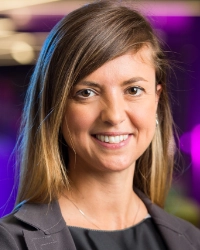 Serena Duchi is Associate Professor at University of Melbourne-Australia and cellular biologist specialized in musculoskeletal diseases and regenerative medicine. Her career integrates international collaboration, research leadership, industry partnerships, and translational science, driving significant advancements in bioengineering and clinical innovation. She received her PhD in Cell Biology and Physiology in 2009 through a joint program between the University of Bologna in Italy and the Medical University of South Carolina in the United States. Early in her career at Italy’s Rizzoli Orthopaedics Institute (2011–2015), she focused on musculoskeletal diseases, which sparked her long-term interest in regenerative medicine. In 2016, Serena Duchi joined the Department of Surgery at the University of Melbourne, where she continues to advance research in tissue engineering. Since 2021, she is the group leader of the REMOD (Regenerative Engineering and Modelling of Osteochondral disease) group, pioneering research in cartilage regeneration and bone disease modelling. She has secured over $7 million in competitive funding, including from the MRFF–ARISTOCRAT Stem Cell Therapies Mission, which will support the first-in-human clinical trial planned for 2026. Her team is developing a one-step procedure for cartilage repair that aims to transform current orthopaedic treatments. Duchi’s achievements have been recognized through awards such as the Veski Innovator of the Year and finalist positions for the Australian Museum Eureka Prizes. Her expertise spans stem cell–based tissue regeneration and drug delivery, hydrogel-based modelling, bioreactor cultivation, and 3D imaging technologies. She is a member of the Aikenhead Centre for Medical Discovery (ACMD), Australia’s first hospital-based bioengineering institute, where she contributes to multidisciplinary efforts bridging basic science and clinical application.
Serena Duchi is Associate Professor at University of Melbourne-Australia and cellular biologist specialized in musculoskeletal diseases and regenerative medicine. Her career integrates international collaboration, research leadership, industry partnerships, and translational science, driving significant advancements in bioengineering and clinical innovation. She received her PhD in Cell Biology and Physiology in 2009 through a joint program between the University of Bologna in Italy and the Medical University of South Carolina in the United States. Early in her career at Italy’s Rizzoli Orthopaedics Institute (2011–2015), she focused on musculoskeletal diseases, which sparked her long-term interest in regenerative medicine. In 2016, Serena Duchi joined the Department of Surgery at the University of Melbourne, where she continues to advance research in tissue engineering. Since 2021, she is the group leader of the REMOD (Regenerative Engineering and Modelling of Osteochondral disease) group, pioneering research in cartilage regeneration and bone disease modelling. She has secured over $7 million in competitive funding, including from the MRFF–ARISTOCRAT Stem Cell Therapies Mission, which will support the first-in-human clinical trial planned for 2026. Her team is developing a one-step procedure for cartilage repair that aims to transform current orthopaedic treatments. Duchi’s achievements have been recognized through awards such as the Veski Innovator of the Year and finalist positions for the Australian Museum Eureka Prizes. Her expertise spans stem cell–based tissue regeneration and drug delivery, hydrogel-based modelling, bioreactor cultivation, and 3D imaging technologies. She is a member of the Aikenhead Centre for Medical Discovery (ACMD), Australia’s first hospital-based bioengineering institute, where she contributes to multidisciplinary efforts bridging basic science and clinical application.
 Serena Duchi is Associate Professor at University of Melbourne-Australia and cellular biologist specialized in musculoskeletal diseases and regenerative medicine. Her career integrates international collaboration, research leadership, industry partnerships, and translational science, driving significant advancements in bioengineering and clinical innovation. She received her PhD in Cell Biology and Physiology in 2009 through a joint program between the University of Bologna in Italy and the Medical University of South Carolina in the United States. Early in her career at Italy’s Rizzoli Orthopaedics Institute (2011–2015), she focused on musculoskeletal diseases, which sparked her long-term interest in regenerative medicine. In 2016, Serena Duchi joined the Department of Surgery at the University of Melbourne, where she continues to advance research in tissue engineering. Since 2021, she is the group leader of the REMOD (Regenerative Engineering and Modelling of Osteochondral disease) group, pioneering research in cartilage regeneration and bone disease modelling. She has secured over $7 million in competitive funding, including from the MRFF–ARISTOCRAT Stem Cell Therapies Mission, which will support the first-in-human clinical trial planned for 2026. Her team is developing a one-step procedure for cartilage repair that aims to transform current orthopaedic treatments. Duchi’s achievements have been recognized through awards such as the Veski Innovator of the Year and finalist positions for the Australian Museum Eureka Prizes. Her expertise spans stem cell–based tissue regeneration and drug delivery, hydrogel-based modelling, bioreactor cultivation, and 3D imaging technologies. She is a member of the Aikenhead Centre for Medical Discovery (ACMD), Australia’s first hospital-based bioengineering institute, where she contributes to multidisciplinary efforts bridging basic science and clinical application.
Serena Duchi is Associate Professor at University of Melbourne-Australia and cellular biologist specialized in musculoskeletal diseases and regenerative medicine. Her career integrates international collaboration, research leadership, industry partnerships, and translational science, driving significant advancements in bioengineering and clinical innovation. She received her PhD in Cell Biology and Physiology in 2009 through a joint program between the University of Bologna in Italy and the Medical University of South Carolina in the United States. Early in her career at Italy’s Rizzoli Orthopaedics Institute (2011–2015), she focused on musculoskeletal diseases, which sparked her long-term interest in regenerative medicine. In 2016, Serena Duchi joined the Department of Surgery at the University of Melbourne, where she continues to advance research in tissue engineering. Since 2021, she is the group leader of the REMOD (Regenerative Engineering and Modelling of Osteochondral disease) group, pioneering research in cartilage regeneration and bone disease modelling. She has secured over $7 million in competitive funding, including from the MRFF–ARISTOCRAT Stem Cell Therapies Mission, which will support the first-in-human clinical trial planned for 2026. Her team is developing a one-step procedure for cartilage repair that aims to transform current orthopaedic treatments. Duchi’s achievements have been recognized through awards such as the Veski Innovator of the Year and finalist positions for the Australian Museum Eureka Prizes. Her expertise spans stem cell–based tissue regeneration and drug delivery, hydrogel-based modelling, bioreactor cultivation, and 3D imaging technologies. She is a member of the Aikenhead Centre for Medical Discovery (ACMD), Australia’s first hospital-based bioengineering institute, where she contributes to multidisciplinary efforts bridging basic science and clinical application.
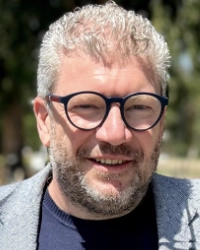 Emanuele Frontoni is a Full Professor of computer science with the University of Macerata and the Co-Director of the VRAI Vision Robotics & Artificial Intelligence Lab.
Emanuele Frontoni is a Full Professor of computer science with the University of Macerata and the Co-Director of the VRAI Vision Robotics & Artificial Intelligence Lab.
Since 2021, he has been included in the annual "World's Top 2% Scientists" list curated by Stanford University and Elsevier, which lists the top 2% of the world's most cited scientists within the "Artificial Intelligence & Image Processing" category.
He is also involved in several national and international technology transfer projects in the fields of AI, Deep Learning, data interoperability, cloud-based technologies, and big multimedia data analysis, extended reality and digital humanities.
He is a member of the European Association for Artificial Intelligence, the European AI Alliance, and the International Association for Pattern Recognition. He served as expert for the EU Commission in the AI H2020 and Horizon Europe Calls and as co-speaker of the European IPEI CIS (Important Project of Common European Interest - Cloud Infrastructure and Services) for the Data Exchange & AI services of the next generation of European Cloud & Edge Services.
 Emanuele Frontoni is a Full Professor of computer science with the University of Macerata and the Co-Director of the VRAI Vision Robotics & Artificial Intelligence Lab.
Emanuele Frontoni is a Full Professor of computer science with the University of Macerata and the Co-Director of the VRAI Vision Robotics & Artificial Intelligence Lab.
Since 2021, he has been included in the annual "World's Top 2% Scientists" list curated by Stanford University and Elsevier, which lists the top 2% of the world's most cited scientists within the "Artificial Intelligence & Image Processing" category.
He is also involved in several national and international technology transfer projects in the fields of AI, Deep Learning, data interoperability, cloud-based technologies, and big multimedia data analysis, extended reality and digital humanities.
He is a member of the European Association for Artificial Intelligence, the European AI Alliance, and the International Association for Pattern Recognition. He served as expert for the EU Commission in the AI H2020 and Horizon Europe Calls and as co-speaker of the European IPEI CIS (Important Project of Common European Interest - Cloud Infrastructure and Services) for the Data Exchange & AI services of the next generation of European Cloud & Edge Services.
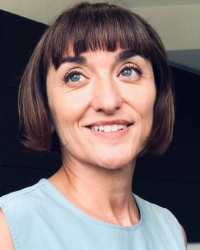 Simona Guidi has 25 years of experience in Quality&Compliance/CMC for biological products and cell and gene therapy products (ATMPs). Ms Guidi has significant experience in GMP compliance assessment for the early stages of ATMPs product development.
Simona Guidi has 25 years of experience in Quality&Compliance/CMC for biological products and cell and gene therapy products (ATMPs). Ms Guidi has significant experience in GMP compliance assessment for the early stages of ATMPs product development.
Ms Guidi actively supported several ATMPs facility teams to achieve the first manufacturing authorization for somatic cell therapy, gene therapy and tissue engineered products in EU-non EU countries for clinical/commercial purposes.
During her career, Ms. Guidi has collaborated with the design teams of ATMPs production sites to assess their compliance with Eu/US GMPs and participated in numerous remediation plans after EMA/FDA regulatory inspections to upgrade production sites to GMP/GMO compliance.
Ms Guidi actively supported several Centralized/Decentralized facility teams to achieve the first manufacturing authorization in EU-non EU countries for clinical purposes.
 Simona Guidi has 25 years of experience in Quality&Compliance/CMC for biological products and cell and gene therapy products (ATMPs). Ms Guidi has significant experience in GMP compliance assessment for the early stages of ATMPs product development.
Simona Guidi has 25 years of experience in Quality&Compliance/CMC for biological products and cell and gene therapy products (ATMPs). Ms Guidi has significant experience in GMP compliance assessment for the early stages of ATMPs product development.
Ms Guidi actively supported several ATMPs facility teams to achieve the first manufacturing authorization for somatic cell therapy, gene therapy and tissue engineered products in EU-non EU countries for clinical/commercial purposes.
During her career, Ms. Guidi has collaborated with the design teams of ATMPs production sites to assess their compliance with Eu/US GMPs and participated in numerous remediation plans after EMA/FDA regulatory inspections to upgrade production sites to GMP/GMO compliance.
Ms Guidi actively supported several Centralized/Decentralized facility teams to achieve the first manufacturing authorization in EU-non EU countries for clinical purposes.
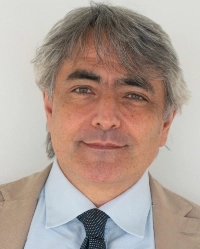 Claudio Jommi is Professor of Management at the Department of Pharmaceutical Sciences, and Director of Master of Regulatory Sciences and Market Access for Medicines and Biotechnologies (DRMKA), Università del Piemonte Orientale, Novara, Italy. He is also member of the Patent and Spin Off Committee of the same University. He was Professor of Practice of Health Policy at SDA Bocconi School of Management, where he held the position of Director of the Master of International Health Care Management Economics and Policy, Director of the Health Policy Area and Scientific Coordinator of the Pharmaceutical Observatory at Cergas (Centre for Research on Health and Social Care Management). He was the President of the Italian Health Economics Association. He is the Editor in Chief of GRHTA (Global and Regional Health Technology Assessment). His research activity is focused on Pharmaceutical Economics, Policy and Management, Health Technology Assessment, Innovation management. He has had his work published in many international and national journals, including Applied Health Economics and Policy, BMC Health Services Research, BMJ Open, Drug Design Development and Therapy, Frontiers in Pharmacology, European Journal of Health Economics, Health Policy, International Journal of Health Planning and Management, Journal of Medical Marketing, Pharmacoeconomics and Pharmacoeconomics Open, PLOS and PLOS Neglected Diseases, Public Money and Management, Social Science and Medicine, Value in Health.
Claudio Jommi is Professor of Management at the Department of Pharmaceutical Sciences, and Director of Master of Regulatory Sciences and Market Access for Medicines and Biotechnologies (DRMKA), Università del Piemonte Orientale, Novara, Italy. He is also member of the Patent and Spin Off Committee of the same University. He was Professor of Practice of Health Policy at SDA Bocconi School of Management, where he held the position of Director of the Master of International Health Care Management Economics and Policy, Director of the Health Policy Area and Scientific Coordinator of the Pharmaceutical Observatory at Cergas (Centre for Research on Health and Social Care Management). He was the President of the Italian Health Economics Association. He is the Editor in Chief of GRHTA (Global and Regional Health Technology Assessment). His research activity is focused on Pharmaceutical Economics, Policy and Management, Health Technology Assessment, Innovation management. He has had his work published in many international and national journals, including Applied Health Economics and Policy, BMC Health Services Research, BMJ Open, Drug Design Development and Therapy, Frontiers in Pharmacology, European Journal of Health Economics, Health Policy, International Journal of Health Planning and Management, Journal of Medical Marketing, Pharmacoeconomics and Pharmacoeconomics Open, PLOS and PLOS Neglected Diseases, Public Money and Management, Social Science and Medicine, Value in Health.
 Claudio Jommi is Professor of Management at the Department of Pharmaceutical Sciences, and Director of Master of Regulatory Sciences and Market Access for Medicines and Biotechnologies (DRMKA), Università del Piemonte Orientale, Novara, Italy. He is also member of the Patent and Spin Off Committee of the same University. He was Professor of Practice of Health Policy at SDA Bocconi School of Management, where he held the position of Director of the Master of International Health Care Management Economics and Policy, Director of the Health Policy Area and Scientific Coordinator of the Pharmaceutical Observatory at Cergas (Centre for Research on Health and Social Care Management). He was the President of the Italian Health Economics Association. He is the Editor in Chief of GRHTA (Global and Regional Health Technology Assessment). His research activity is focused on Pharmaceutical Economics, Policy and Management, Health Technology Assessment, Innovation management. He has had his work published in many international and national journals, including Applied Health Economics and Policy, BMC Health Services Research, BMJ Open, Drug Design Development and Therapy, Frontiers in Pharmacology, European Journal of Health Economics, Health Policy, International Journal of Health Planning and Management, Journal of Medical Marketing, Pharmacoeconomics and Pharmacoeconomics Open, PLOS and PLOS Neglected Diseases, Public Money and Management, Social Science and Medicine, Value in Health.
Claudio Jommi is Professor of Management at the Department of Pharmaceutical Sciences, and Director of Master of Regulatory Sciences and Market Access for Medicines and Biotechnologies (DRMKA), Università del Piemonte Orientale, Novara, Italy. He is also member of the Patent and Spin Off Committee of the same University. He was Professor of Practice of Health Policy at SDA Bocconi School of Management, where he held the position of Director of the Master of International Health Care Management Economics and Policy, Director of the Health Policy Area and Scientific Coordinator of the Pharmaceutical Observatory at Cergas (Centre for Research on Health and Social Care Management). He was the President of the Italian Health Economics Association. He is the Editor in Chief of GRHTA (Global and Regional Health Technology Assessment). His research activity is focused on Pharmaceutical Economics, Policy and Management, Health Technology Assessment, Innovation management. He has had his work published in many international and national journals, including Applied Health Economics and Policy, BMC Health Services Research, BMJ Open, Drug Design Development and Therapy, Frontiers in Pharmacology, European Journal of Health Economics, Health Policy, International Journal of Health Planning and Management, Journal of Medical Marketing, Pharmacoeconomics and Pharmacoeconomics Open, PLOS and PLOS Neglected Diseases, Public Money and Management, Social Science and Medicine, Value in Health.
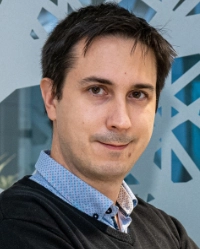 Nereo Kalebic is a Group Leader at Human Technopole in Milan. He obtained his degree in Molecular Biology at the University of Zagreb in Croatia in 2007. In 2012 he completed his PhD in Molecular Biology at the European Molecular Biology Laboratory (EMBL) and the University of Heidelberg. During his PhD, Nereo studied the role of microtubule post-translational modifications in development and function of nervous system. From 2013 to 2019, he carried out post-doctoral research in the group of Wieland Huttner at the Max Planck Institute of Molecular Cell Biology and Genetics in Dresden studying the development and evolution of human neocortex. Nereo’s current research focuses on molecular and cell biological mechanisms underlying human neocortex development and its implications for human neurodevelopmental disorders and brain tumors.
Nereo Kalebic is a Group Leader at Human Technopole in Milan. He obtained his degree in Molecular Biology at the University of Zagreb in Croatia in 2007. In 2012 he completed his PhD in Molecular Biology at the European Molecular Biology Laboratory (EMBL) and the University of Heidelberg. During his PhD, Nereo studied the role of microtubule post-translational modifications in development and function of nervous system. From 2013 to 2019, he carried out post-doctoral research in the group of Wieland Huttner at the Max Planck Institute of Molecular Cell Biology and Genetics in Dresden studying the development and evolution of human neocortex. Nereo’s current research focuses on molecular and cell biological mechanisms underlying human neocortex development and its implications for human neurodevelopmental disorders and brain tumors.
 Nereo Kalebic is a Group Leader at Human Technopole in Milan. He obtained his degree in Molecular Biology at the University of Zagreb in Croatia in 2007. In 2012 he completed his PhD in Molecular Biology at the European Molecular Biology Laboratory (EMBL) and the University of Heidelberg. During his PhD, Nereo studied the role of microtubule post-translational modifications in development and function of nervous system. From 2013 to 2019, he carried out post-doctoral research in the group of Wieland Huttner at the Max Planck Institute of Molecular Cell Biology and Genetics in Dresden studying the development and evolution of human neocortex. Nereo’s current research focuses on molecular and cell biological mechanisms underlying human neocortex development and its implications for human neurodevelopmental disorders and brain tumors.
Nereo Kalebic is a Group Leader at Human Technopole in Milan. He obtained his degree in Molecular Biology at the University of Zagreb in Croatia in 2007. In 2012 he completed his PhD in Molecular Biology at the European Molecular Biology Laboratory (EMBL) and the University of Heidelberg. During his PhD, Nereo studied the role of microtubule post-translational modifications in development and function of nervous system. From 2013 to 2019, he carried out post-doctoral research in the group of Wieland Huttner at the Max Planck Institute of Molecular Cell Biology and Genetics in Dresden studying the development and evolution of human neocortex. Nereo’s current research focuses on molecular and cell biological mechanisms underlying human neocortex development and its implications for human neurodevelopmental disorders and brain tumors.
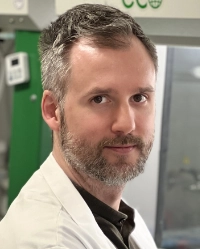 Samuele Negro graduated in Biomedical Sciences and later earned a PhD in Neurobiology from the University of Padua. Currently, after several work experiences in Italy and abroad, he is a researcher at the University of Padua. His work focuses on neurodegenerative diseases, including Amyotrophic Lateral Sclerosis. Through social media, he has become known as Samuscientist, where, with a touch of irony, he portrays the everyday life of Italian researchers, sharing the many challenges of this profession as well as the deep passion for science that unites them.
Samuele Negro graduated in Biomedical Sciences and later earned a PhD in Neurobiology from the University of Padua. Currently, after several work experiences in Italy and abroad, he is a researcher at the University of Padua. His work focuses on neurodegenerative diseases, including Amyotrophic Lateral Sclerosis. Through social media, he has become known as Samuscientist, where, with a touch of irony, he portrays the everyday life of Italian researchers, sharing the many challenges of this profession as well as the deep passion for science that unites them.
 Samuele Negro graduated in Biomedical Sciences and later earned a PhD in Neurobiology from the University of Padua. Currently, after several work experiences in Italy and abroad, he is a researcher at the University of Padua. His work focuses on neurodegenerative diseases, including Amyotrophic Lateral Sclerosis. Through social media, he has become known as Samuscientist, where, with a touch of irony, he portrays the everyday life of Italian researchers, sharing the many challenges of this profession as well as the deep passion for science that unites them.
Samuele Negro graduated in Biomedical Sciences and later earned a PhD in Neurobiology from the University of Padua. Currently, after several work experiences in Italy and abroad, he is a researcher at the University of Padua. His work focuses on neurodegenerative diseases, including Amyotrophic Lateral Sclerosis. Through social media, he has become known as Samuscientist, where, with a touch of irony, he portrays the everyday life of Italian researchers, sharing the many challenges of this profession as well as the deep passion for science that unites them.
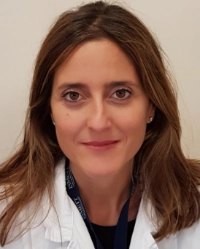 Dr. Giada Pietrosi is an Associate Professor and Medical Doctor at IRCCS-ISMETT, UPMC Italy, specializing in regenerative medicine and liver disease research. With several years of dedicated experience, she focuses on the therapeutic application of perinatal stem cells to address advanced liver diseases. Her primary research utilizes rodent models to investigate the efficacy of these stem cells in reversing liver damage and reducing portal hypertension, a critical complication of chronic liver disease. In addition to her in vivo work, Dr. Pietrosi conducts in vitro studies exploring the use of perinatal stem cells as a novel treatment strategy for spontaneous bacterial peritonitis, a frequent and severe infection in patients with liver cirrhosis. Notably, her last research has evaluated human amnion-derived mesenchymal stromal stem cells (MSCs) for the treatment of Carbapenem-Resistant Enterobacterales (CRE) infections in the context of decompensated cirrhosis, addressing a critical unmet medical need. Her investigations integrate state-of-the-art omics approaches to dissect the molecular pathways involved in stem cell-driven liver regeneration and immune response modulation. Recognized for her contributions through numerous peer-reviewed publications and international collaborations, Dr. Pietrosi will present her latest findings on perinatal stem cells in liver repair and infection control, highlighting new frontiers in translational liver research.
Dr. Giada Pietrosi is an Associate Professor and Medical Doctor at IRCCS-ISMETT, UPMC Italy, specializing in regenerative medicine and liver disease research. With several years of dedicated experience, she focuses on the therapeutic application of perinatal stem cells to address advanced liver diseases. Her primary research utilizes rodent models to investigate the efficacy of these stem cells in reversing liver damage and reducing portal hypertension, a critical complication of chronic liver disease. In addition to her in vivo work, Dr. Pietrosi conducts in vitro studies exploring the use of perinatal stem cells as a novel treatment strategy for spontaneous bacterial peritonitis, a frequent and severe infection in patients with liver cirrhosis. Notably, her last research has evaluated human amnion-derived mesenchymal stromal stem cells (MSCs) for the treatment of Carbapenem-Resistant Enterobacterales (CRE) infections in the context of decompensated cirrhosis, addressing a critical unmet medical need. Her investigations integrate state-of-the-art omics approaches to dissect the molecular pathways involved in stem cell-driven liver regeneration and immune response modulation. Recognized for her contributions through numerous peer-reviewed publications and international collaborations, Dr. Pietrosi will present her latest findings on perinatal stem cells in liver repair and infection control, highlighting new frontiers in translational liver research.
 Dr. Giada Pietrosi is an Associate Professor and Medical Doctor at IRCCS-ISMETT, UPMC Italy, specializing in regenerative medicine and liver disease research. With several years of dedicated experience, she focuses on the therapeutic application of perinatal stem cells to address advanced liver diseases. Her primary research utilizes rodent models to investigate the efficacy of these stem cells in reversing liver damage and reducing portal hypertension, a critical complication of chronic liver disease. In addition to her in vivo work, Dr. Pietrosi conducts in vitro studies exploring the use of perinatal stem cells as a novel treatment strategy for spontaneous bacterial peritonitis, a frequent and severe infection in patients with liver cirrhosis. Notably, her last research has evaluated human amnion-derived mesenchymal stromal stem cells (MSCs) for the treatment of Carbapenem-Resistant Enterobacterales (CRE) infections in the context of decompensated cirrhosis, addressing a critical unmet medical need. Her investigations integrate state-of-the-art omics approaches to dissect the molecular pathways involved in stem cell-driven liver regeneration and immune response modulation. Recognized for her contributions through numerous peer-reviewed publications and international collaborations, Dr. Pietrosi will present her latest findings on perinatal stem cells in liver repair and infection control, highlighting new frontiers in translational liver research.
Dr. Giada Pietrosi is an Associate Professor and Medical Doctor at IRCCS-ISMETT, UPMC Italy, specializing in regenerative medicine and liver disease research. With several years of dedicated experience, she focuses on the therapeutic application of perinatal stem cells to address advanced liver diseases. Her primary research utilizes rodent models to investigate the efficacy of these stem cells in reversing liver damage and reducing portal hypertension, a critical complication of chronic liver disease. In addition to her in vivo work, Dr. Pietrosi conducts in vitro studies exploring the use of perinatal stem cells as a novel treatment strategy for spontaneous bacterial peritonitis, a frequent and severe infection in patients with liver cirrhosis. Notably, her last research has evaluated human amnion-derived mesenchymal stromal stem cells (MSCs) for the treatment of Carbapenem-Resistant Enterobacterales (CRE) infections in the context of decompensated cirrhosis, addressing a critical unmet medical need. Her investigations integrate state-of-the-art omics approaches to dissect the molecular pathways involved in stem cell-driven liver regeneration and immune response modulation. Recognized for her contributions through numerous peer-reviewed publications and international collaborations, Dr. Pietrosi will present her latest findings on perinatal stem cells in liver repair and infection control, highlighting new frontiers in translational liver research.
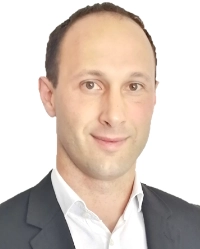 Filippo Piccinini completed with the maximum score (i.e. 110 Cum Laude) both the Bachelor and the Master degree in Biomedical Engineering. Immediately after the Master graduation in 2009, he won a PhD ministry scholarship in Informatics. He completed perfectly in time his Doctorate, publishing 4 journal articles and 7 conference proceedings directly during the 3 years of the PhD time. He won several awards for thesis (e.g. “Mario Pasquini award for the best graduated student of the year”) and other merits. Then, he created a strong network of international collaborators and most of his ideas were supported by grants from international institutions (e.g. EMBO, FEBS, EACR, NEUBIAS, UICC, MAECI). His main research fields are “Microscopy”, “Artificial Intelligence”, “Image Processing”, “Big Data Analysis”, and “In Vitro 3D Models”. Today he has around 60 articles published in scientific journals, including articles in Nature Methods and Nature Reviews Drug Discovery. Currently, he is working as Research Fellow at the cancer hospital “IRCCS Istituto Romagnolo per lo Studio dei Tumori (IRST) Dino Amadori" (Meldola, Italy) and as Associate Professor at the University of Bologna where he holds several courses of Informatics, Statistics and Physics. The full List of Publications and the entire Curriculum Vitae is available at: www.filippopiccinini.it
Filippo Piccinini completed with the maximum score (i.e. 110 Cum Laude) both the Bachelor and the Master degree in Biomedical Engineering. Immediately after the Master graduation in 2009, he won a PhD ministry scholarship in Informatics. He completed perfectly in time his Doctorate, publishing 4 journal articles and 7 conference proceedings directly during the 3 years of the PhD time. He won several awards for thesis (e.g. “Mario Pasquini award for the best graduated student of the year”) and other merits. Then, he created a strong network of international collaborators and most of his ideas were supported by grants from international institutions (e.g. EMBO, FEBS, EACR, NEUBIAS, UICC, MAECI). His main research fields are “Microscopy”, “Artificial Intelligence”, “Image Processing”, “Big Data Analysis”, and “In Vitro 3D Models”. Today he has around 60 articles published in scientific journals, including articles in Nature Methods and Nature Reviews Drug Discovery. Currently, he is working as Research Fellow at the cancer hospital “IRCCS Istituto Romagnolo per lo Studio dei Tumori (IRST) Dino Amadori" (Meldola, Italy) and as Associate Professor at the University of Bologna where he holds several courses of Informatics, Statistics and Physics. The full List of Publications and the entire Curriculum Vitae is available at: www.filippopiccinini.it
 Filippo Piccinini completed with the maximum score (i.e. 110 Cum Laude) both the Bachelor and the Master degree in Biomedical Engineering. Immediately after the Master graduation in 2009, he won a PhD ministry scholarship in Informatics. He completed perfectly in time his Doctorate, publishing 4 journal articles and 7 conference proceedings directly during the 3 years of the PhD time. He won several awards for thesis (e.g. “Mario Pasquini award for the best graduated student of the year”) and other merits. Then, he created a strong network of international collaborators and most of his ideas were supported by grants from international institutions (e.g. EMBO, FEBS, EACR, NEUBIAS, UICC, MAECI). His main research fields are “Microscopy”, “Artificial Intelligence”, “Image Processing”, “Big Data Analysis”, and “In Vitro 3D Models”. Today he has around 60 articles published in scientific journals, including articles in Nature Methods and Nature Reviews Drug Discovery. Currently, he is working as Research Fellow at the cancer hospital “IRCCS Istituto Romagnolo per lo Studio dei Tumori (IRST) Dino Amadori" (Meldola, Italy) and as Associate Professor at the University of Bologna where he holds several courses of Informatics, Statistics and Physics. The full List of Publications and the entire Curriculum Vitae is available at: www.filippopiccinini.it
Filippo Piccinini completed with the maximum score (i.e. 110 Cum Laude) both the Bachelor and the Master degree in Biomedical Engineering. Immediately after the Master graduation in 2009, he won a PhD ministry scholarship in Informatics. He completed perfectly in time his Doctorate, publishing 4 journal articles and 7 conference proceedings directly during the 3 years of the PhD time. He won several awards for thesis (e.g. “Mario Pasquini award for the best graduated student of the year”) and other merits. Then, he created a strong network of international collaborators and most of his ideas were supported by grants from international institutions (e.g. EMBO, FEBS, EACR, NEUBIAS, UICC, MAECI). His main research fields are “Microscopy”, “Artificial Intelligence”, “Image Processing”, “Big Data Analysis”, and “In Vitro 3D Models”. Today he has around 60 articles published in scientific journals, including articles in Nature Methods and Nature Reviews Drug Discovery. Currently, he is working as Research Fellow at the cancer hospital “IRCCS Istituto Romagnolo per lo Studio dei Tumori (IRST) Dino Amadori" (Meldola, Italy) and as Associate Professor at the University of Bologna where he holds several courses of Informatics, Statistics and Physics. The full List of Publications and the entire Curriculum Vitae is available at: www.filippopiccinini.it
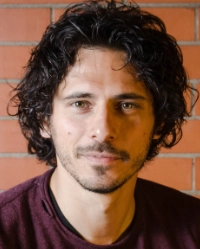 Leonardo Ricotti is a Full Professor of Bioengineering and head of the Regenerative Technologies Lab at the BioRobotics Institute, Scuola Superiore Sant’Anna (Pisa, Italy). He leads an interdisciplinary research group of approximately 30 members engaged in multiple national and international projects (www.regenerativelab.it). He also coordinates the Joint Lab on Biostimulation and Function Recovery, a collaboration between Scuola Superiore Sant’Anna and the Auxilium Vitae Rehabilitation Center (Volterra, Italy). He is the Coordinator of the PhD Program in Biorobotics at Scuola Superiore Sant’Anna, which involves ~ 150 PhD students working on bioengineering- and robotics-related topics. His research focuses on regenerative medicine and artificial organs. He has co-authored around 170 scientific publications, contributed six book chapters on biomedical technologies, and he is the inventor of 20 patents. As an entrepreneur, he co-founded and serves as Chief Scientific Officer (CSO) of two spin-off companies: Relief s.r.l. and MyEcho s.r.l. Prof. Ricotti is an Associate Editor for Scientific Reports, IEEE Transactions on Medical Robotics and Bionics, and IEEE Transactions on NanoBioscience. He has received several awards for both his research (e.g., Nanomaterials 2022 Young Investigator Award, European Biomaterials and Tissue Engineering Doctoral Award, “Massimo Grattarola” Award) and entrepreneurial achievements (e.g., PNICube Award, Lifebility Award, Starttime prize).
Leonardo Ricotti is a Full Professor of Bioengineering and head of the Regenerative Technologies Lab at the BioRobotics Institute, Scuola Superiore Sant’Anna (Pisa, Italy). He leads an interdisciplinary research group of approximately 30 members engaged in multiple national and international projects (www.regenerativelab.it). He also coordinates the Joint Lab on Biostimulation and Function Recovery, a collaboration between Scuola Superiore Sant’Anna and the Auxilium Vitae Rehabilitation Center (Volterra, Italy). He is the Coordinator of the PhD Program in Biorobotics at Scuola Superiore Sant’Anna, which involves ~ 150 PhD students working on bioengineering- and robotics-related topics. His research focuses on regenerative medicine and artificial organs. He has co-authored around 170 scientific publications, contributed six book chapters on biomedical technologies, and he is the inventor of 20 patents. As an entrepreneur, he co-founded and serves as Chief Scientific Officer (CSO) of two spin-off companies: Relief s.r.l. and MyEcho s.r.l. Prof. Ricotti is an Associate Editor for Scientific Reports, IEEE Transactions on Medical Robotics and Bionics, and IEEE Transactions on NanoBioscience. He has received several awards for both his research (e.g., Nanomaterials 2022 Young Investigator Award, European Biomaterials and Tissue Engineering Doctoral Award, “Massimo Grattarola” Award) and entrepreneurial achievements (e.g., PNICube Award, Lifebility Award, Starttime prize).
 Leonardo Ricotti is a Full Professor of Bioengineering and head of the Regenerative Technologies Lab at the BioRobotics Institute, Scuola Superiore Sant’Anna (Pisa, Italy). He leads an interdisciplinary research group of approximately 30 members engaged in multiple national and international projects (www.regenerativelab.it). He also coordinates the Joint Lab on Biostimulation and Function Recovery, a collaboration between Scuola Superiore Sant’Anna and the Auxilium Vitae Rehabilitation Center (Volterra, Italy). He is the Coordinator of the PhD Program in Biorobotics at Scuola Superiore Sant’Anna, which involves ~ 150 PhD students working on bioengineering- and robotics-related topics. His research focuses on regenerative medicine and artificial organs. He has co-authored around 170 scientific publications, contributed six book chapters on biomedical technologies, and he is the inventor of 20 patents. As an entrepreneur, he co-founded and serves as Chief Scientific Officer (CSO) of two spin-off companies: Relief s.r.l. and MyEcho s.r.l. Prof. Ricotti is an Associate Editor for Scientific Reports, IEEE Transactions on Medical Robotics and Bionics, and IEEE Transactions on NanoBioscience. He has received several awards for both his research (e.g., Nanomaterials 2022 Young Investigator Award, European Biomaterials and Tissue Engineering Doctoral Award, “Massimo Grattarola” Award) and entrepreneurial achievements (e.g., PNICube Award, Lifebility Award, Starttime prize).
Leonardo Ricotti is a Full Professor of Bioengineering and head of the Regenerative Technologies Lab at the BioRobotics Institute, Scuola Superiore Sant’Anna (Pisa, Italy). He leads an interdisciplinary research group of approximately 30 members engaged in multiple national and international projects (www.regenerativelab.it). He also coordinates the Joint Lab on Biostimulation and Function Recovery, a collaboration between Scuola Superiore Sant’Anna and the Auxilium Vitae Rehabilitation Center (Volterra, Italy). He is the Coordinator of the PhD Program in Biorobotics at Scuola Superiore Sant’Anna, which involves ~ 150 PhD students working on bioengineering- and robotics-related topics. His research focuses on regenerative medicine and artificial organs. He has co-authored around 170 scientific publications, contributed six book chapters on biomedical technologies, and he is the inventor of 20 patents. As an entrepreneur, he co-founded and serves as Chief Scientific Officer (CSO) of two spin-off companies: Relief s.r.l. and MyEcho s.r.l. Prof. Ricotti is an Associate Editor for Scientific Reports, IEEE Transactions on Medical Robotics and Bionics, and IEEE Transactions on NanoBioscience. He has received several awards for both his research (e.g., Nanomaterials 2022 Young Investigator Award, European Biomaterials and Tissue Engineering Doctoral Award, “Massimo Grattarola” Award) and entrepreneurial achievements (e.g., PNICube Award, Lifebility Award, Starttime prize).